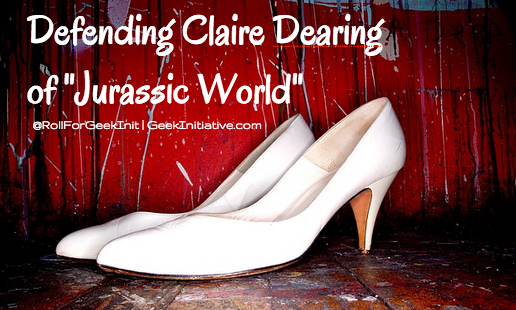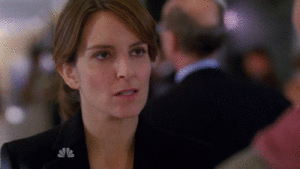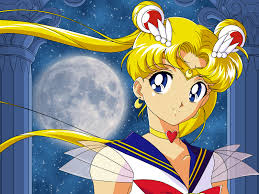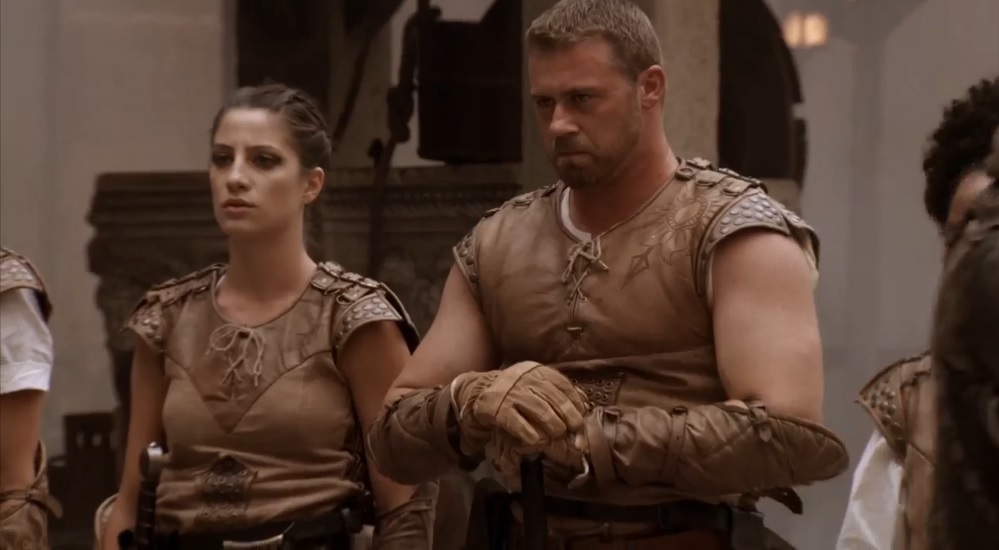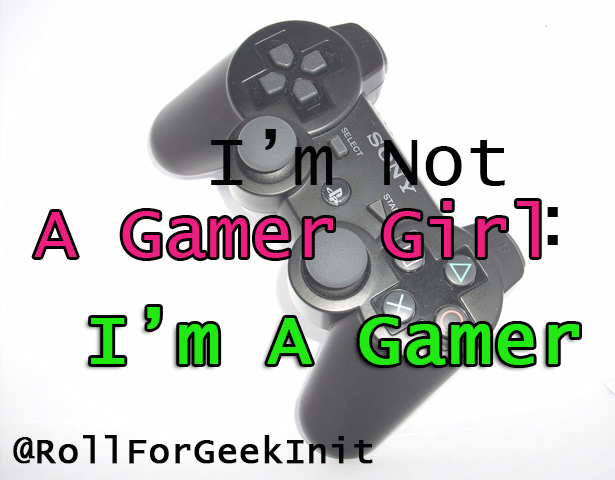“Jurassic World” debuted successfully, if you look at its earnings. But franchise fans, filmmakers, and critics continue to debate over whether the movie is sexist. [Note: This post contains no major plot spoilers. You know the drill. It’s a dinosaur park. Things get crazy. Character development happens.]
I went into the movie – and came out of it – with the same question, particularly regarding Claire Dearing (Bryce Dallas Howard) and her feelings about kids, including her nephews. In the beginning of the film, Claire’s sister promises her that she’ll want kids someday.
Cue the feminist eyeroll.
But cue something else – sympathy for Claire. Whether you want kids or not, if you’re a woman, you get these questions frequently; sometimes even from coworkers and strangers. It’s kind of creepy and certainly infuriating when people pry. The scene made me sympathize with Claire, though I wish it would have felt more like ‘isn’t this ridiculous?’ instead of ‘isn’t this a normal thing women should deal with?’
Machine vs. Nature Theme
Beyond that is a lesson important for various age groups represented in the film. Claire, like her teenage nephew, spends so much time plugged in that she misses out on the need for human relationships. Connecting with her family isn’t just a bridge to wanting more out of life than a job (which admittedly stuffs Claire into a trope), it’s about connecting with nature and realizing the importance of life beyond the latest Facebook post.
From Hammond to Sattler
I see how Claire’s transition can seem tropey, but consider the allusions to “Jurassic Park.” Claire begins with much of the same flaws as John Hammond (Sir Richard Attenborough): she’s basically in control and in favor of playing god.
Over the course of the film, she (along with everyone else) loses control of the park situation. She does lose some of the authority that Hammond maintained as far as decision-making, but she gains something else: autonomy. Where Hammond is injured and immobilized, Claire is on the move.
She is in the action and out in the park. While the Claire of yesterday would have just had someone else attend to her nephews and the park operations, the present, emotionally engaged Claire takes responsibility for what is going wrong. She acknowledges that she cannot control everything, and in that, she becomes a stronger character – one a lot more like Dr. Ellie Sattler (Laura Dern) from the first film. As a career-minded woman who also runs a household, I find that acknowledgement important.
It also presents another parallel. When Muldoon tells Ellie that things are “all right,” she denies the consolation. She does not need or want a man to placate her fears; for Ellie, truth is key to survival.
This Hammond-to-Sattler shift is underscored by costume changes. At the start, she is dressed like a femme Hammond; she then transitions to the ‘adventure’ style shirt (sleeves rolled up and shirt tied at the waist) like Ellie’s salmon button-down in the first movie.
After that, she loses the outer layer and wears a camisole, an homage to Ellie’s costume shift to blue tank top. The skirt gets the requisite shortening/slit up the side, but it’s not sexualized. It’s more of an afterthought. Tropey? Yeah. Practical? As someone who does a lot of running in skirts in LARP, absolutely.
And while it is ridiculous for Claire to stay in heels, it makes sense, too. Why should she have to give up all parts of who she is and how she looks to become the woman she will be tomorrow? I respect her deeper reasons for retaining them.
This is especially important as her past-turned-sort-of-present-boyfriend is the one telling her to ditch the shoes. Think about what her refusal really says, from a feminist perspective: “I’m willing to do what I need to do to make this happen, but I’m not going to change every aspect of myself just because we’re in a partnership.”
In the first movie, one of the more tender scenes involves Sattler and Hammond. They discuss the nature of life, nurturing, control, and invention. If you re-watch that scene, it’s almost a conversation that end-of-movie Claire could have with beginning-of-movie Claire. Yes, Claire Dearing refuses to give up part of who she is but still shows enough character development to span two characters from the previous movie!
Dr. Sattler: A Precedent Set
Ellie Sattler presents an iconic precedent in the “Jurassic Park” franchise. I was 13 when the film came out and this character was one that greatly impacted me at a crucial age.
[Tweet “In ‘Jurassic Park,’ Sattler was comfortable with her own complexities.”]
In “Jurassic Park,” Sattler was an overt, unapologetic feminist comfortable with her own complexities. Unhindered by the trappings of Gamergate and tumblr-era social justice, she faced trying situations without denying the multi-faceted aspects of her nature.
She was nurturing with a sick triceratops, fierce and determined about getting out of the park, protective of her relationship and her partner, aggressive in her desire to be heard in social and scientific conversation, traditional in her desire to be a mother, and forward-thinking about her field. Yes, one woman can be all of those things; we just aren’t always written that way in movie scripts.
In short, Ellie’s amazing. For someone like me, there might be a Furiosa or a Full Metal Bitch or a Captain Marvel, but there will never be another character exactly like Ellie. It’s unfair of me, as a fan and a feminist, to put that comparison on Claire Dearing. Each woman is her own and I’m pleased with the many homages to Ellie’s character in “Jurassic World.”
That said, I could have used just a little bit of “woman inherits the earth.” A segment of the modern audience clamors for that, and the movie didn’t deliver overt feminism. It provided subtle homages to one of my favorite feminist characters instead. But this also goes to show that a ‘strong female character’ doesn’t have to be a vocal champion as feminism. She doesn’t have to be martial like Xena, either. But we do expect her to know herself and defend herself, which is what both Sattler and Dearing accomplish.
Claire’s Relationship
So Claire happens to be into Owen (Chris Pratt) the velociraptor whisperer. He’s clever (despite not being a girl – see what I did there?), rugged, and good at his job. He also used to be in the Navy. But Claire’s criticized for being into the rugged hunk who fulfills many gender stereotypes about what it means to be ‘masculine.’
And if you hate her for that, I want you to know I’m giving you the stink eye.
She rebuffed (and rebuffs) him when he’s disrespectful because he’s a jerk. She does not entertain or reward this behavior.
He learns to be more respectful before he gets more of her consideration; it isn’t simply a survival scenario that changes, and despite the fact that he’s rugged and handsome, Owen has character development, too. (Also, why do we have to hate Owen but not Star-Lord? They share more characteristics than being played by the same actor, and Star-Lord isn’t exactly a sweetheart, either.)
As a feminist, I like that Claire makes her own choices about who she is involved with and when. Instead of sticking it out in a would-be relationship that wasn’t timed well, the pair broke it off after one date. Then things change and they – sticking with the theme of the movie – do not deny their natures. It’s okay that part of Claire’s self-discovery and character development involves this relationship, because let’s be real – Owen’s a pretty cool guy.
He reminds me of a few other men, really, like my husband, a muscle-bound former Marine. Or MCU Thor (Chris Hemsworth), one of my all-time favorite characters…and his buddy, Captain America (Chris Evans). Feminism is about everyone having choices, not about belittling a woman for making a traditional choice. At the end of the day, I could choose to be with a woman or a genderfluid individual or a rugged straight guy. That last option just happens to be the type of person I’m attracted to. It doesn’t make me less of a feminist…and it certainly doesn’t make Claire less independent or less worthy of respect.
Yes, I want to see diversity in relationships in films. Yes, this is a presumably straight, cis white couple. And yes, there are already thousands of movies about those. I want more diversity, but I’m not going to hate on Claire for being attracted to the very same type of guy I’m interested in.
Claire isn’t perfect. Owen isn’t perfect. But they develop and become less annoying. As a team, they become better people. He learns to respect humans a bit and she learns to respect the dinosaurs.
What did you think about these characters? Let us know in the comments!

